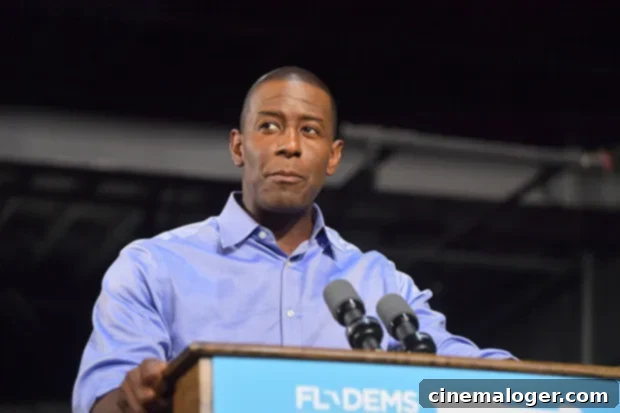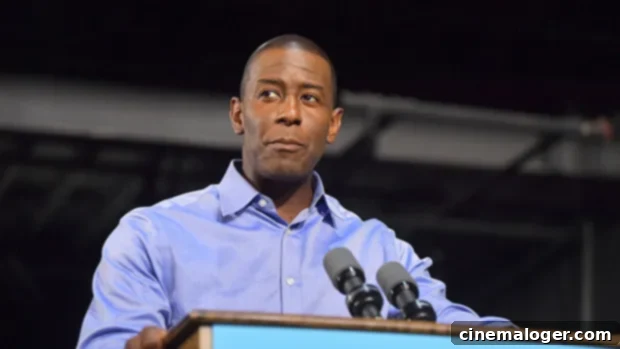Andrew Gillum’s Candid Revelation: Navigating Bisexuality, Politics, and Personal Redemption in Florida
UPDATE, September 14, 2020: Former Florida gubernatorial candidate, Andrew Gillum, aged 41, made a profound personal revelation during a September 14 interview with Tamron Hall, publicly identifying himself as bisexual. Gillum, who had previously faced intense public scrutiny regarding his personal life, addressed the speculation directly. “To be very honest with you, when you didn’t ask the question, you put it out there is whether or not I identify as gay. And the answer is I don’t identify as gay, but I do identify as bisexual, and that is something that I have never shared publicly before,” he explained on Hall’s talk show. This candid admission marked a significant moment for the former mayor, offering clarity amidst a period of personal challenges and public speculation. The interview provided a platform for Gillum to share his truth, highlighting the journey of self-discovery and acceptance that often accompanies such deeply personal announcements, especially for figures in the public eye. His statement underscored the distinction between different sexual orientations, emphasizing the importance of accurate representation and self-identification.
The highly anticipated interview also delved into the circumstances surrounding a February 2020 incident. Police had discovered an “inebriated” Gillum in a Miami Beach hotel room while responding to a call regarding a “possible drug overdose.” This event garnered widespread media attention and fueled rampant rumors about his personal life. Gillum addressed the incident head-on, explaining its role in his decision to confront certain aspects of his identity. The February event became a pivotal point, prompting a period of deep introspection and leading him towards this public declaration. The candid discussion with Tamron Hall provided context for the previous incident, transforming it from a source of scandal into a catalyst for transparency and personal growth, demonstrating Gillum’s willingness to openly discuss his struggles and evolution.
At the time of the Miami incident, another man, Aldo Mejias, was present with Gillum in the hotel room. This detail, combined with the nature of the police call, intensified media speculation and public assumptions about Gillum’s sexuality and private life. Following the incident, Gillum issued a public apology and subsequently entered a rehabilitation facility the following month, seeking help for alcohol abuse. In his interview with Tamron Hall, Gillum reflected on the painful assumptions made about him in the aftermath of the incident. He expressed profound distress over the perception that he was “somehow living a lie in my marriage and in my family.” This particular accusation, he conveyed, was the most hurtful. Gillum eloquently defended the human right to make mistakes without having one’s entire life invalidated. “What was most hurtful was this belief that I was somehow living a lie in my marriage and in my family. That was the most hurtful to me. Because I believe we are all entitled to mistakes, and I believe we are entitled to those mistakes without having every other respectable and redeeming part of our lives invalidated,” he stated. His wife, R. Jai Gillum, also appeared in the interview, offering her unwavering support and reinforcing the strength of their family unit through these challenges. Their shared narrative emphasized resilience, honesty, and the complexities of public and private life, especially when confronting deeply personal issues like sexual identity and addiction.
Former Florida governor candidate Andrew Gillum tells Tamron Hall he’s bisexual: “That is something I have never shared publicly before” pic.twitter.com/prUW7NPk1C
— The Recount (@therecount) September 14, 2020
Andrew Gillum’s Political Ascent: A Look Back at His Gubernatorial Ambition
Before his deeply personal revelation in 2020, Andrew Gillum, then 39, stood on the precipice of making history in Florida politics. In the highly contested 2018 midterm election, Gillum emerged as a formidable Democratic candidate for governor, seeking to fill the open seat left by term-limited Rick Scott. His opponent was Republican Representative Ron DeSantis, also 39. The race was a fierce battleground, drawing national attention and symbolizing a broader ideological clash in American politics. Gillum’s campaign was particularly significant as he aimed to become the first Black governor in Florida’s history, a milestone that would have reverberated across the state and the nation. Understanding Gillum’s political career and platform provides crucial context to the man who would later share such a profound personal truth with the world.
1. A Significantly Progressive Platform: Championing Change for Florida
Andrew Gillum distinguished himself with a decidedly progressive platform that resonated with a significant segment of Florida’s electorate. As outlined on his official website during his campaign, his vision for Florida was one of confronting long-standing challenges head-on. He articulated a comprehensive agenda focused on economic revitalization, robust investment in public education, the expansion and protection of healthcare access, and an aggressive stance on climate change, advocating for a transition to a clean energy economy. Specifically, Gillum proposed raising the state’s minimum wage to $15 an hour, a popular policy among progressives aimed at combating income inequality and lifting working families out of poverty. He also pushed for increased corporate taxes to fund public services and demanded greater accountability from corporations. On education, Gillum advocated for significant increases in teacher salaries, arguing that competitive pay was essential to attract and retain top talent in Florida’s schools, alongside reducing class sizes and investing in early childhood education programs. For healthcare, a cornerstone of his platform was the expansion of Medicaid, which would have extended coverage to hundreds of thousands of uninsured Floridians, aligning with the Affordable Care Act’s provisions. Furthermore, his commitment to environmental protection involved not only investing in renewable energy sources like solar power but also implementing policies to safeguard Florida’s vital natural resources, from its coastlines to the Everglades, against the impacts of climate change. His bold proposals marked a clear departure from the more conservative policies that had dominated Florida politics for years, offering voters a distinct alternative.
2. The Mayor of Tallahassee: A Young Leader’s Journey
Gillum’s political roots were firmly planted in Florida. Born and raised in the Sunshine State, he pursued higher education there before embarking on his public service career. His ascent was notably rapid, particularly for someone of his age. At just 23, Andrew Gillum made history by becoming the youngest person ever elected to the Tallahassee City Commission. This early success underscored his charisma, political acumen, and ability to connect with voters. Over the next decade, he steadily rose through the ranks, gaining invaluable experience in local governance. In 2014, his dedication and vision culminated in his election as the Mayor of Tallahassee, the state capital. During his tenure as mayor, Gillum focused on initiatives aimed at fostering economic development, improving public safety, and enhancing the quality of life for Tallahassee residents. His leadership was characterized by efforts to expand opportunities for small businesses, address infrastructure needs, and build stronger community ties. The experience gained as mayor provided him with a practical understanding of policy implementation and the complex challenges facing Florida’s communities, preparing him for a larger role on the state stage.

3. A Major Upset: Defying Expectations in the Primary
Andrew Gillum’s victory in the Democratic primary for governor in 2018 was widely considered a major political upset, catching many observers by surprise. He was running against a field of more established candidates, most notably centrist former Florida Representative Gwen Graham, who was the daughter of a popular former governor and senator. Pundits and political strategists had largely expected Graham, with her name recognition and moderate appeal, to secure the nomination. Gillum, a relatively young mayor from Tallahassee, was seen as an underdog with a more progressive, untested platform. His primary win was a testament to the power of grassroots organizing, a compelling progressive message, and the ability to mobilize a diverse coalition of voters, including younger demographics and communities of color. This unexpected triumph instantly propelled him into the national spotlight, transforming him from a local leader into a leading progressive voice in one of the country’s most pivotal electoral battlegrounds. His victory underscored a growing appetite within the Democratic party for bold, progressive leadership and signaled a potential shift in Florida’s political landscape, challenging the traditional political establishment.
4. Donald Trump’s Opposition: A Nationalized Race
The 2018 Florida gubernatorial race quickly became nationalized, largely due to the direct involvement of then-President Donald Trump. Unsurprisingly, Trump swiftly endorsed Gillum’s Republican opponent, Ron DeSantis, and launched a series of highly critical attacks against Gillum. DeSantis, a staunch Trump ally, embraced the president’s brand of politics, even featuring bizarre campaign ads designed to appeal directly to Trump’s base. These ads included DeSantis building a “wall” with his baby using Lego bricks, reading excerpts from Trump’s book The Art of The Deal to his child, and teaching her to say “Make America Great Again.” These unconventional tactics highlighted the nationalistic and populist themes that defined much of Trump’s political influence. Following Gillum’s primary win, Trump took to Twitter to label him a “failed socialist mayor,” despite evidence suggesting Tallahassee was not, in fact, failing economically or socially. “Not only did Congressman Ron DeSantis easily win the Republican Primary, but his opponent in November is his biggest dream….a failed Socialist Mayor named Andrew Gillum who has allowed crime & many other problems to flourish in his city. This is not what Florida wants or needs!”, the president tweeted. This direct intervention by the president framed the gubernatorial race as a proxy battle for the national political direction, further intensifying the scrutiny on Gillum and his progressive agenda. The “socialist” label, often used by Republicans to disparage progressive candidates, aimed to create fear among more moderate voters and solidify conservative opposition to Gillum.
5. High-Profile Endorsements: Rallying Progressive Support
Andrew Gillum’s campaign received significant endorsements that underscored his standing within the national progressive movement. Most notably, Delaware Senator Bernie Sanders actively campaigned for Gillum, much to the chagrin of President Trump and his allies. Sanders, a leading figure in American democratic socialism, provided Gillum with invaluable support, drawing large crowds and energizing progressive voters across Florida. Following Gillum’s primary victory, Sanders issued a statement praising his vision: “Andrew Gillum laid out a vision for a new course for the state of Florida and our country. That is a vision that I know will not only excite Democrats but will also bring independents and Republicans into the political process.” This endorsement cemented Gillum’s position as a torchbearer for the progressive wing of the Democratic Party. In addition to Sanders, billionaire donor and environmental activist Tom Steyer also threw his considerable influence and financial backing behind Gillum’s campaign. Steyer lauded Gillum’s primary win as “further proof that when Democrats put forward candidates that tell the truth and embrace a bold vision for the future, they win.” These endorsements provided Gillum with significant momentum, resources, and credibility, illustrating how his progressive platform resonated with influential figures and a national movement eager for transformative change. They highlighted a growing belief that authentic, bold leadership could indeed lead to electoral success, even in traditionally conservative-leaning states.
Andrew Gillum’s journey, from a promising young mayor and gubernatorial hopeful to a public figure bravely sharing his bisexuality, is a complex narrative of political ambition, personal struggle, and the relentless pursuit of authenticity. His willingness to confront his personal truths, particularly after intense public scrutiny, speaks to a broader theme of redemption and the evolving landscape of public figures navigating identity in the modern era. While his gubernatorial bid ultimately fell short, his impact on Florida politics and his recent candid revelations have solidified his place as a significant and memorable figure, pushing boundaries both politically and personally.
